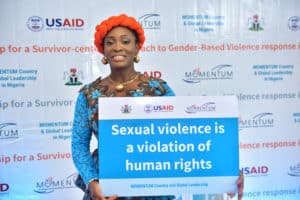Ms. Chioma Oduenyi on the Universal Nature of Gender Based Violence and her work in Nigeria
25 November 2022
 On the occasion of the 16 days of Activism against Gender-Based Violence (GBV) Women in Global Health talked to Ms Chioma Oduenyi, recent Awardee of Heroines of Health 2022, about her work in Nigeria. Ms Odenyi has pioneered gender integration and mainstreaming through her work for Jhpiego, an international non-profit health organization affiliated with Johns Hopkins University.
On the occasion of the 16 days of Activism against Gender-Based Violence (GBV) Women in Global Health talked to Ms Chioma Oduenyi, recent Awardee of Heroines of Health 2022, about her work in Nigeria. Ms Odenyi has pioneered gender integration and mainstreaming through her work for Jhpiego, an international non-profit health organization affiliated with Johns Hopkins University.
A summary of the interview is provided below.
How prevalent is the problem of GBV in Nigeria?
In Nigeria, the national demographic and health survey tells us that three out of every ten Nigerian women over 15 years have suffered one form of GBV or another. When you begin to drill down into the different forms of violence, such as intimate partner violence, which can include sexual, emotional, physical and socioeconomic abuse, it gets even deeper. Then you begin to see that many women aged up to 49 years have suffered this violence at the hands of their partners. Statistics also reveal that one in four girls are abused before age 18 in Nigeria, with many experiencing their sexual initiation through rape.
What impact does it have on women that you see?
First of all, we know it’s something done to anyone because of their social differences, and it’s a human rights violation. This has huge impacts, depending on the violence experienced. If anyone survives sexual abuse, it has huge impacts on their health and their entire wellbeing. Then the emotional, psychological, social abuse will have different dimensions that we may not see.
In intimate relationships, women are at high risk of contracting HIV/AIDS, at high risk of not using contraceptives, at high risk of death or murder. Around 40% of women who have been murdered, have been murdered by their intimate partners. Evidence has shown that when women are pregnant, violence increases. They become at risk then of miscarriage and further complications. The fetus is unsafe also. It can lead to stillbirths, premature delivery. It can lead to deaths of the unborn child. If you look at it from the point of view of intimate partner violence, GBV has huge impacts. We’ve read accounts from women who have suffered rape from a young age. It lives with them throughout their whole life. It affects them in the sense that they are unable to get education from the psychological challenges they face. The list is endless. It can make monsters out of people. Many cannot understand why they should be living. They would prefer not to live than live with that experience. Some can become suicidal. Any form of GBV carries a huge impact. As human beings, as societies, we need to begin to call a spade a spade, and look at gender-based violence for what it is, a human rights experience.
What are the drivers of GBV that you see in your work?
I am currently Project Director for the USAID-funded MOMENTUM Country and Global Leadership project in Nigeria, led by Jhpiego, where I lead work to prevent and respond to gender-based violence, including reducing child early and forced marriage.
Evidence has shown us that certain social norms are driving GBV. So I work with the communities, through local leaders, national government leaders in Nigeria, the Federal Ministry of Women Affairs–that has federal mandates to work to address GBV, and the Federal Ministry of Health, who also work in all the health facilities around the country. We look at GBV as a complete package of primary and secondary prevention. Most survivors of GBV visit health facilities first, and that health center might be the only point of contact. We work with partners and stakeholders to provide a holistic set of services that complement each other, such as non-clinical services including mental health, social support, legal services. The target of my project is to create a platforms to bring survivor-centered GBV approaches under this holistic program to reach those affected. We know that prevention is better than cure and so a large part of the work also focuses on tackling the social norms that are underpinning the issue of GBV in our communities.
What is your top ask of decision-makers and governments?
Let’s not just do this for the news. Let’s ask if we can put our minds and our hearts to this work, recognizing that justice for one, is justice for all. This shouldn’t be about ticking off activities. We should keep interrogating ourselves and asking ourselves, are we reaching GBV survivors with services? Are we able to prevent it from happening by tackling gender norms that drive GBV?
Most of our leaders are men. We need to tell ourselves the truth first. No-one deserves to suffer GBV of any form and there are actions we can take. Leaders should support laws and policies that create an enabling environment for perpetrators to be brought to justice. Then irrespective of who the perpetrators are, the laws should work. We should make sure our services and infrastructure is strengthened so we can provide the special kind of care that is needed. For that, we need capacity building of service providers. And finally, communities need to be sensitized about the norms driving GBV. If we can do little bits of all of this, we can change the current narrative on GBV.
Read more: Heroine of Health 2022 Awardee, Ms. Chioma Oduenyi